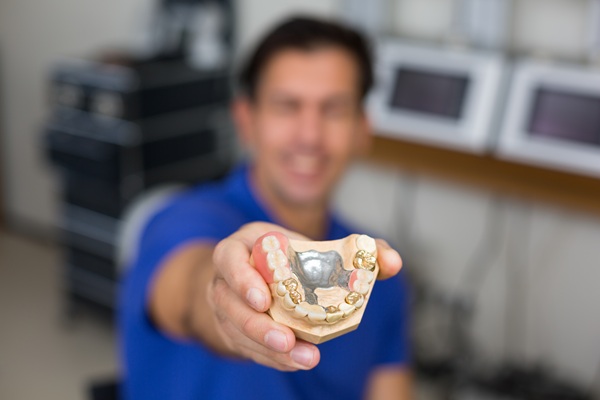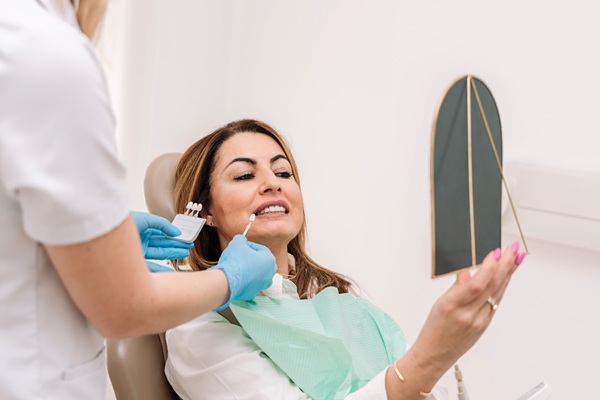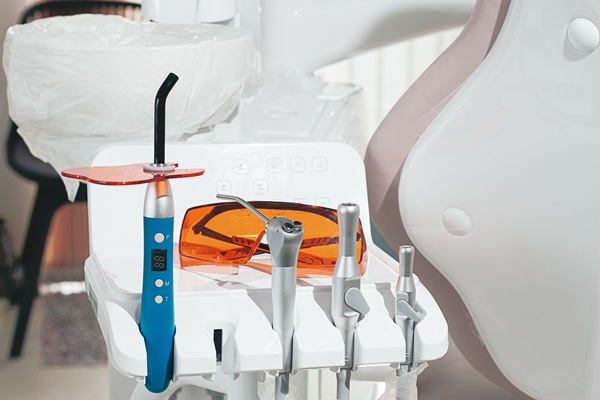Can the Wrong Adhesive Lead to Denture Damage?

Are you looking for more information about denture adhesives? When you need to wear dentures so you can achieve good oral health, it is important to understand everything there is to know about dentures, including proper denture care. Denture care also includes potentially wearing denture adhesives.
An overview of denture adhesives
According to the Food and Drug Administration, in most cases, properly fitted and maintained dentures should not require the use of denture adhesives. However, that does not mean denture adhesives cannot be helpful to certain patients. While only some denture wearers need to use an adhesive, many choose to do so for some additional security, as they want dentures to stay on their own. There are a few different types of adhesives, such as gels, pastes, and powders.
How do denture adhesives work?
Denture adhesives work by applying the adhesive to the dentures and then placing the dentures on the gums. Adhesives make it so that the dentures stay more securely in place. This film of gel, paste, or powder creates a layer between the dentures and the gums, making it much more difficult for them to move or shift around in the mouth.
Who benefits from using adhesives?
When someone gets new dentures, and they fit properly, there is often little to no need for them to use any type of denture adhesive. However, if the patient's mouth begins to change, it may be in their best interest to consider using an adhesive to keep their dentures securely in place.
Changes within the mouth are considered normal when someone loses most or all of their teeth, as the tooth roots that fully support the jawbone are no longer there. Unlike dental implants, traditional dentures do not stimulate the jawbone, leading to oral and facial changes. Since dentures that do not fit properly can cause sore spots and even injury, many people use denture adhesives to keep them in place and prevent irritation.
Can the use of the wrong adhesive cause damage to dentures?
Not necessarily, denture adhesives are specifically made to be used with dentures, so, for the most part, they will not cause any damage to dentures. However, there are a few important things denture wearers should know before choosing to use an adhesive. They are as follows:
- Adhesives should be used according to instructions and in moderation.
- They also need to be completely removed from the dentures on a daily basis.
- When extended uses of adhesives are used, it is essential to undergo periodic assessments by a dental professional.
Can we help you?
Want to understand more about denture damage? The last thing you want to happen when you get new dentures is for them to somehow become damaged. Since it is possible to damage dentures, it is important to understand how to properly care for dentures so they will last for many years. Give us a call today so that we can help you with your dentures.
Request an appointment here: https://www.smilesofriverstone.com or call Smiles of Riverstone at (281) 410-1187 for an appointment in our Missouri City office.
Check out what others are saying about our dental services on Yelp: Dentures in Missouri City, TX.
Related Posts
Dental veneers create a brighter, more uniform smile and often help correct cosmetic concerns that make teeth look uneven or worn. Many patients want improvements that look natural while still enhancing confidence in everyday settings. Veneers offer a versatile option for refining color, shape, and symmetry in some cases without extensive orthodontic treatment. A dentist…
Teeth whitening is one of the most popular cosmetic dental procedures. Many individuals explore various teeth whitening options to improve the brightness of their smile. When deciding between take-home teeth whitening trays and over-the-counter products, it is important to understand how each works and the long-term results you can expect from each option.Take-home whitening trays…
Dental bonding is a simple and effective way to make immediate improvements to the smile by covering stains or fixing small chips, cracks, and gaps in the teeth, providing immediate improvement. The process is painless and quick and does not require major changes to the natural teeth. Those looking for an easy and affordable way…
Invisalign® is a fast way to straighten teeth, using clear, removable trays. However, smoking can negatively impact patient comfort and aligner appearance throughout treatment. It can even prolong treatment times. Learning more about how smoking can affect Invisalign treatment can help motivate patients to limit or quit tobacco altogether.Smoking tobacco can reduce the efficacy and…


